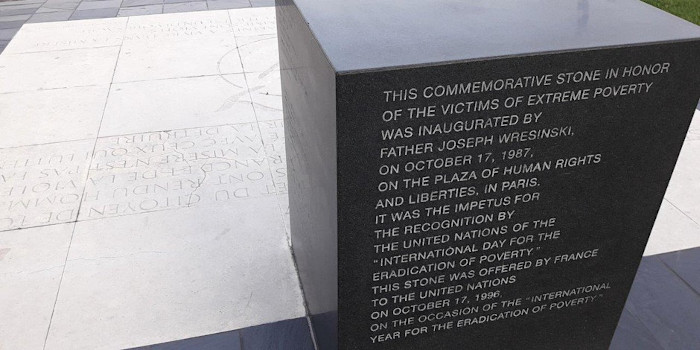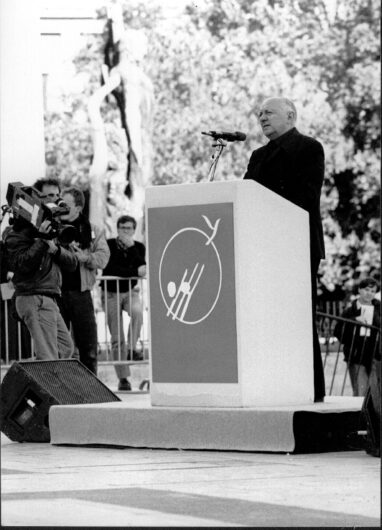Origins of October 17

Above: Commemorative stone honouring the victims of poverty at the UN.

Below is an excerpt from a press conference given by ATD Fourth World founder Joseph Wresinski. This press conference took place just before October 17, 1987, the first World Day for Overcoming Extreme Poverty. It is now officially known as the United Nations International Day for the Eradication of Poverty. Here, Wresinski outlines some of the origins of this day and why October 17, 1987 marked a breakthrough in how Human Rights are seen.
This text has been edited from the original translation.
***
Inevitable and necessary
Poverty — extreme poverty — has become so blatant these days that it is both inevitable and necessary that we hold a public event [for all to see] to commemorate the victims of extreme poverty worldwide. It is also a reminder that thanks to those living in extreme poverty, a decisive step forward has been made in our understanding of human rights.

Those who experience poverty have taught us that the greatest danger facing them is the distinction between civil and political freedoms on one hand and economic, social and cultural rights on the other. It is because we have created such a distinction that extreme poverty has intensified in affluent countries in recent years. It has always existed, but has come to the fore precisely because we have been so preoccupied with civil and political rights that we have forgotten economic and social rights. We have not taken steps to eradicate extreme poverty because of our concerns, our battles …
Not free
We have forgotten that the long-term unemployed quickly become dependent on assistance. And why? Because they no longer have social protection, they cannot belong to a trade union or a political party and are no longer consulted. They depended on those who helped them, and got forgotten. We have come to understand that these people are no longer free, and can no longer participate.
Those who have been evicted cannot take part in associations defending tenants’ interests. Those in extreme poverty, who may be plagued by ill-health, cannot go to hospital; even if they did, they may be refused treatment. These individuals and families without a recognised home no longer have the right to vote and are not considered fellow citizens.
Unable to take part
Little by little, we have come to understand that without health, without money, and when people’s minds are haunted by problems of personal or family survival, men, women and families in extreme poverty are unable to take part in life in their communities. Children are more likely to leave school unable to read and write, condemning them to a future of unemployment, a lack of family life, unstable professional lives, as well as (and this is perhaps worst of all) the inability to express themselves and feel that they are stakeholders in the country in which they live and its future development.
The indivisibility of all human rights is becoming less disputed and increasingly recognised in public opinion thanks to people in extreme poverty. It is essential to mark this breakthrough in our thinking on Human Rights. This is why we are holding this public act of commemoration on October 17.

